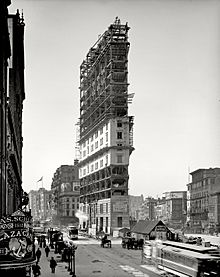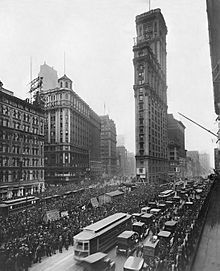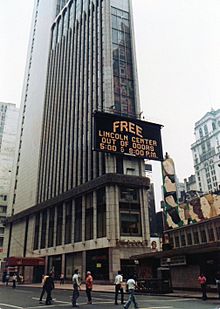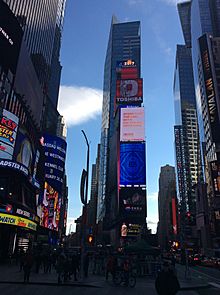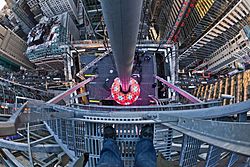One Times Square facts for kids
Quick facts for kids One Times Square |
|
|---|---|
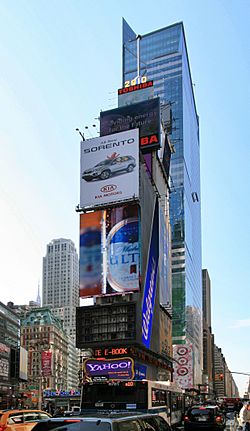 |
|
| General information | |
| Location | 1 Times Square New York, NY 10036 |
| Coordinates | 40°45′23″N 73°59′11″W / 40.756421°N 73.9864883°W |
| Completed | 1904 |
| Owner | Jamestown L.P. and Sherwood Equities |
| Height | |
| Antenna spire | 417 ft (127 m) |
| Roof | 363 ft (111 m) |
| Technical details | |
| Floor count | 25 |
| Floor area | 110,599 sq ft (10,275.0 m2) |
| Design and construction | |
| Architect | Cyrus L.W. Eidlitz, Andrew C. McKenzie (presently HLW International) |
| Developer | The New York Times |
One Times Square is a famous 25-story skyscraper in New York City. It stands at 42nd Street and Broadway. The building is also known as the New York Times Tower or simply the Times Tower. It was designed by Cyrus L. W. Eidlitz.
The tower was first built for The New York Times newspaper. The newspaper moved in during January 1904. The owner of the Times even convinced the city to rename the area "Times Square". Eight years later, the newspaper moved to a bigger building. One Times Square stayed important because of the yearly New Year's Eve "ball drop". Also, a large lighted news ticker was added in 1928.
Today, One Times Square is mostly covered in huge advertising billboards. These signs make a lot of money because of the building's great spot in Times Square. This makes it one of the most valuable advertising places in the world. Most of the inside of the building is empty, except for a Walgreens store on the lower floors. There are plans to add a new Times Square museum and an observation deck in the future.
Contents
History of the Building
Home of the New York Times
One Times Square was finished in 1904. It became the main office for The New York Times newspaper. The newspaper officially moved in during January 1905. The owner, Adolph Ochs, also convinced the city to rename the area around the building. It used to be called Longacre Square, but it became Times Square because of the newspaper. The building had fancy decorations, like stone and terracotta on its outside. It also had a walkway that connected to the New York City Subway's Times Square station.
To celebrate the new building, the Times held a New Year's Eve party on December 31, 1904. They set off fireworks from the roof at midnight to welcome 1905. This event was very popular, with 200,000 people watching. They kept doing it every year until 1907. For New Year's Eve 1908, Adolph Ochs tried something new. He lowered a lit ball down the building's flagpole at midnight. This idea came from time balls that showed the exact time of day. This "ball drop" tradition still happens at One Times Square today. It brings about one million people every year.
The Times Moves Out
In 1913, only eight years after moving in, the Times newspaper moved its main office. It went to 229 West 43rd Street. The Times stayed there until 2007. Later, it moved to The New York Times Building on Eighth Avenue. Even after leaving One Times Square, the Times still owned the tower for a while.
On November 6, 1928, a special news ticker was added near the bottom of the building. People called it the "zipper." It first used 14,800 light bulbs. The display was controlled by a system inside the building. Small letter pieces were put into frames to spell out news. As the frames moved, the letters lit up the bulbs outside. Today, the zipper uses modern LED technology. The first news headline on the zipper announced Herbert Hoover's win in the presidential election that day. The zipper showed other big news stories, sports updates, and weather. On August 14, 1945, the zipper famously announced Japan's surrender from World War II to a huge crowd in Times Square.
New Owners and Uses
The Times sold the building in 1961 to an advertising expert named Douglas Leigh. Leigh then sold it to Allied Chemical in 1963. Allied Chemical changed the building's outside a lot. They spent $10 million to replace the stone and terracotta with marble. The building was sold several more times over the years.
After the Times sold the building, the news zipper was not always on. It was turned off from 1961 to 1965, and again from 1977 to 1986. In 1986, the newspaper Newsday brought the ticker back. They ran it until 1994. Later, Dow Jones & Company took over in 1995.
From 1990 to 1996, Sony had a huge screen called a Jumbotron on the outside of the tower. It showed ads and news. It was also used by the TV show Late Show with David Letterman. They could show a live video from their studio on the screen. Sony later decided not to renew its lease, and the Jumbotron was removed in 1996.
One Times Square still has stores on its lower floors. In the late 1990s, a Warner Bros. store was there. Later, a J.C. Penney pop-up store opened. In 2008, the pharmacy chain Walgreens opened a large store in the building. Walgreens also added a new digital sign. This sign is 17,000 square feet and has 12 million LEDs. It is one of the biggest LED signs in Times Square. The basement of the tower is used to store items for the New Year's Eve celebrations. This includes the ball itself and other special items.
In 2017, the building's owners shared plans for its empty spaces. They want to build a museum about the history of Times Square on floors 15 to 17. The 18th floor would have a new observatory. The ground floor will also be updated to make a bigger entrance to the New York City Subway's Times Square–42nd Street station, which is right under the building. Work on the subway entrance started in 2019.
Big Billboards
In 1992, the owners of One Times Square faced financial problems. In 1995, the building was sold to a company called Lehman Brothers. The new owners realized it would be too expensive to fix up the inside for new offices. Instead, they decided to use the building for advertising. They wanted to use its great location in Times Square. The outside of One Times Square was changed to hold many large billboard signs.
In 1996, the first electronic billboards were put on One Times Square. These included a Cup Noodles sign with steam effects and an animated Budweiser sign. In October, a big video screen from ITT Corporation was added to the top of the tower. It showed video ads and public service messages. In December 1996, a Panasonic screen called Astrovision was put at the base of the tower.
Lehman Brothers sold One Times Square in 1997 for $117 million. Documents showed that the billboards were making $7 million a year. This was a huge profit! Because many tourists visit Times Square (over 100 million people a year) and the building is seen during New Year's Eve, the money from the signs grew. By 2012, it was over $23 million a year. This makes it one of the most valuable advertising spots in the world, like London's Piccadilly Circus.
From 1996 to 2006, Nissin Foods had a Cup Noodles billboard with smoke effects. This sign was replaced in 2006 by a General Motors billboard with a Chevrolet clock. However, the Chevrolet Clock was removed in 2009. It was later replaced by a Kia Motors ad, and then a Dunkin' Donuts display in 2010.
In 1998, Discover Card took over the top screen from ITT Corporation. This was part of a ten-year deal. Discover Card also became an official sponsor of Times Square's New Year's Eve 2000 celebrations.
In 2006, News Corporation took over the Astrovision screen from NBC. In 2010, Sony returned to One Times Square. They replaced the News Corp. screen with a new high-definition LED display.
In December 2007, Toshiba became the sponsor of the top screen for ten years. During 2008, the upper part of One Times Square was updated. New Toshiba high-definition LED displays were installed. The roof was also redesigned for a bigger New Year's Eve ball. This new ball became a permanent part of the building starting in 2009. In 2017, Toshiba announced they would end their sponsorship in early 2018.
In 2019, the separate billboard screens on the front of the tower were replaced. Now, there is one large, 350-foot-tall Samsung LED display. It has a very high resolution.
Images for kids
See also
 In Spanish: One Times Square para niños
In Spanish: One Times Square para niños
 | Emma Amos |
 | Edward Mitchell Bannister |
 | Larry D. Alexander |
 | Ernie Barnes |


